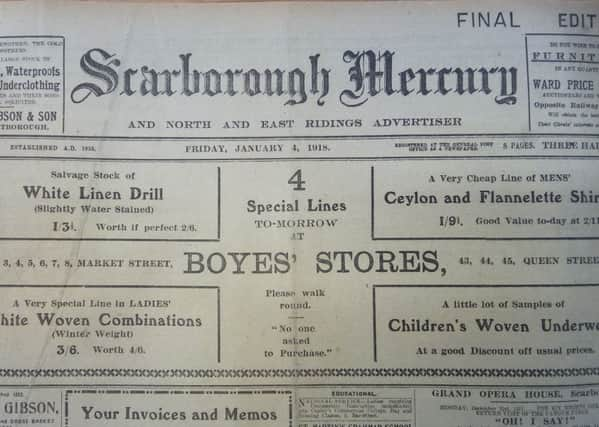1918 court: Soldier issues cheques but can't foot the bill


Mr J Whitfield appeared for the accused and he pleaded not guilty to the charges. The court confirmed itself to the first charge at the outset.
Major Wm Parker, London Regiment, said Lieut Rae commenced an eight week course of instruction on the 12th of January, 1918, at a School of Instruction at Bedford. Mess bills were rendered at the end of each month. He paid the first month in cash, and at the termination of the course an account of £6 5s 2d was paid by cheque and returned marked “N.S.” - which he was informed meant “not sufficient.” Accused’s adjutant afterwards paid the amount and so far as the London Regiment was concerned the account was closed.
Advertisement
Hide AdAdvertisement
Hide AdPhillip Theodore Davis, a clerk with Messrs Cox and Co, gave particulars of defendant’s banking account. He was generally overdrawn. On the 7th of March he was in credit to the extent of £1 5s 4d less bank charges, but Messrs Cox & Co gave defendant notice that the account would be closed, several cheques having been stopped as there was not sufficient money in the bank to meet them.
Witness, in reply to Mr Whitfied, admitted that defendant’s step-father had given an overdraft for £20 and that guarantee was returned about the 20th of April, 1918. Witness, however, suggested that the guarantee terminated in December last.
Asked by the Court whether the guarantee was for a limited period, whereas said guarantees were usually for a short period, and very seldom indeed extended for a longer period than six months. In this case the guarantee had been in existence about twelve months.
Mr Whitfield argued that it was a continuing guarantee, and that his client had a right to trade upon it. Whatever was the practice of the bank, they had legal power to out-force it.
Advertisement
Hide AdAdvertisement
Hide AdThe Judge Advocate ruled that the bank should give notice of the termination of a guarantee.
Witness: We had no guarantee at that time, and we had previously advised the officer to that effect.
By the Judge Advocate: When did you advise him?
Witness: On the 8th of December, as far as I could say.
Mr Whitfield having successfully argued that certain correspondence could not be put in, submitted that on the evidence there was no case for the accused to answer. If there was a valid guarantee in existence to the extent of £20, and if on March 7th there was a credit balance of something like 17s, he would be entitled to draw cheques up to over £20. The guarantee was given to Messrs Cox & Co in 1916 and was in existence quite a month after the cheque was given. It was admitted by Messrs Cox’s representative that the guarantee was given without limit of time, and the prosecution must show by legal evidence that a good notice was given for the accused bringing that guarantee to an end.
That evidence had not been given.
A member of the court pointed that a question by the President which would have got the information had been stopped by Mr Whitfield. It appeared to him that the accused had to prove that he had reasonable ground for believing that the cheque would be honoured.
The Court over-ruled Mr Whitfield’s submission.
Advertisement
Hide AdAdvertisement
Hide AdDefendant in evidence said when he gave the cheque he had reasonable grounds for supposing that they would be honoured. His stepfather had given Messrs Cox a guarantee for £20 sometime in 1916, and when he gave the first cheque he had credit of something like 7s 10d apart from the £20.
Throughout January and February he was drawing on the guarantee and back pay. When the cheques were drawn he had not received intimation from the bank that the guarantee had been brought to a close and that the account had been closed. The letters had followed him about.
The court found the defendant not guilty on all charges and he was acquitted.